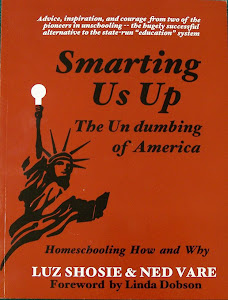“Our schools should not remain places where the enormous potential of the human brain is systematically eroded, and possibly destroyed.” – Frank Smith, Insult to Intelligence
Almost everyone seems to agree that the government school system is doing a poor job and costs far too much. That is a huge problem for our county, and our future as a successful society depends on solving it. Many also agree that the system uses every excuse for its bad performance instead of examining its own actions and beliefs and theories. In fact, if we ask the state Dept. of Ed. or the local school district for their theory of learning, we find that it does not exist. So, in order to discover the principles on which public schools operate, we must examine what they actually do, and assume that their actions are based on a set of beliefs that, if combined, comprise the State Theory of Learning. Here are those beliefs:
1. Children must be forced to learn
2. Learning requires teaching
3. Schools are the primary site for learning
4. Learning requires rewards and punishments
5. Children should be segregated by age
Do you agree with the theory so far? Try a few more:
6. Knowledge and skills can be learned without context
7. Children’s work must be continuously judged and graded by others
8. Knowledge is divided into “subjects,” studied in “units” in linear sequence
9. It takes twelve years to learn the needed knowledge and skills
Do you believe any of that? What is going on here? There’s more:
10. Education begins and ends when children enter and leave school
11. Central authority must decide what children should know, and when
12. Uniformity is the goal of education
Is that theory valid? In light of what is known about how humans learn, every one of those “principles” is partly or completely wrong. Therefore, the state’s Theory of Education – the basis for the government’s schools – is totally wrong.
If that isn’t bad enough, the school system also has a bad attitude. Consider: Neither teachers nor students are trusted to make important decisions about their lives in school; legislatures, unions and school boards make them. Another part of the schools’ bad attitude is that they do not trust parents and often treat them insultingly, even though most education experts acknowledge that parents are the children’s primary influence. In sum, we see that the schools operate on a bad theory and with a destructive attitude.
And what is the result of the above? Today, after spending more and more years in schools consuming larger and larger sums of taxpayers’ money, too many children are showing fewer skills and less knowledge than ever. Meanwhile, according to John K. Williams, teacher and writer: “A massive empire has been spawned, ruled by a priesthood of bureaucrats, administrators, curriculum developers, and ‘resource personnel.’ They, not children, are the beneficiaries of compulsory, state-controlled schooling.”
While some teachers actually work against the official theory in order to create a learning environment, the system supports teachers who act as willing emissaries of its theory. It disguises and even rewards incompetence, indifference and dishonesty. This conflict results in teacher frustration and the high turnover rate.
Despite the bad theory and practices, we often hear, “If schools are so bad, how come most children seem to do OK?” The fact is that millions do not do OK. Bruce Thomas, of Children’s Learning Project, in Chicago, says, “One of the most disturbing characteristics of the system is that it does least well by those who most need it.”
Children learn what they’re taught. Instead of useful knowledge and skills, today they learn what Benjamin Bloom calls a latent curriculum of docility, competition, conformity and dishonesty in bleak isolation from the real world. Thomas adds, “Students are cast in the role of apprentices in the schools’ negative culture. They attend to what the adults do rather than what they say; and they learn quickly and thoroughly.” Children suffer the consequences of a system that is not only inadequate but also damaging.
Ned Vare is a former private school teacher, businessman, author; his articles appear on line at www.borntoexplore.org; he is an unschooling advocate.
Technorati Tags: [government school], [school reform], [dumbing down], [poor quality schooling], [school bureaucracy].

